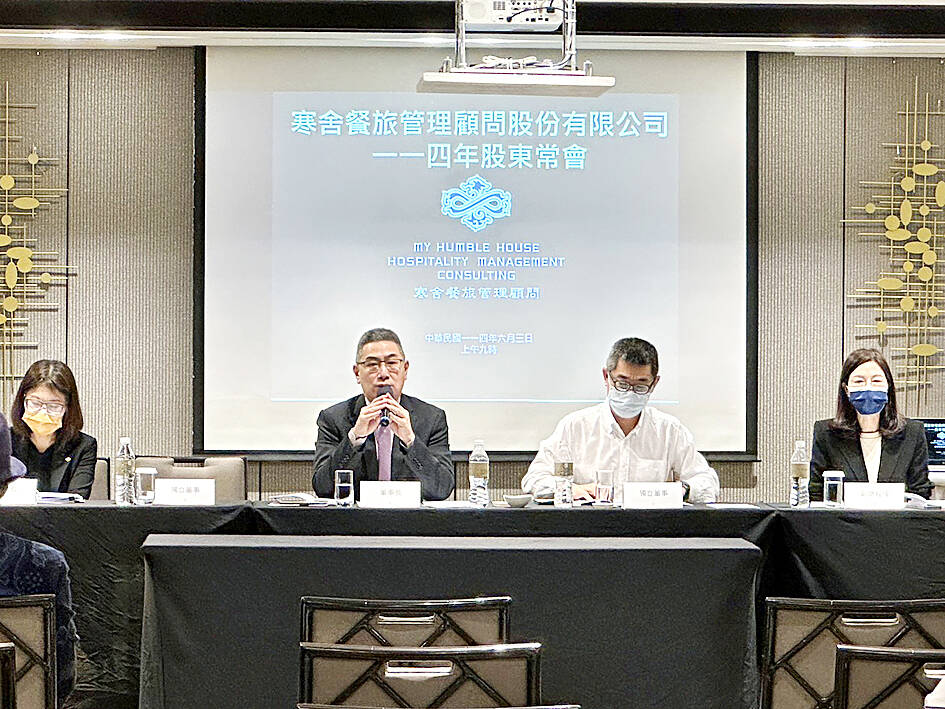Hotel operator My Humble House Hospitality Management Consulting Co (寒舍餐旅) yesterday forecast continued business growth, aided by major trade shows, concerts and sporting events.
The company told shareholders it expects further business improvement in the second half of this year, supported by the return of international tour groups, seasonal holidays and major trade exhibitions such as the recently concluded Computex in Taipei.
These factors are driving demand for accommodation, food and beverage, as well as gift packages across the group’s properties, it said.

Photo courtesy of My Humble House Hospitality Management Consulting Co
Consolidated revenue reached NT$1.77 billion (US$58.99 million) in the first four months of this year, an increase of 2.99 percent year-on-year, company data showed.
Net income in the first quarter was NT$56.93 million, down 65.85 percent from a year earlier, while earnings per share fell to NT$0.62 from NT$1.82.
Shareholders approved the distribution of a cash dividend of NT$1 per share, based on last year’s earnings per share of NT$5.39, representing a payout ratio of 18.55 percent.
My Humble House said the Sheraton Grand Taipei Hotel (台北喜來登) achieved a 92 percent occupancy rate during Computex last month, up 11 percent from a year earlier, while another property, Le Meridien Taipei (台北寒舍艾美酒店), reached 95 percent occupancy, an annual increase of 4 percent.
With international tourism recovering and targeted marketing initiatives in place, the company is well-positioned for a strong second half of the year, it said.
It is to enhance its pricing and marketing strategies and collaborate with Marriott International to improve market share, it added.
Separately, hotel operator Leofoo Tourism Group (六福旅遊集團) told shareholders it recorded better performance in its hospitality segment, judging by occupancy rates so far this year that surpass last year’s figures.
The company’s Courtyard by Marriott Taipei in Nangang (台北六福萬怡) benefited from its convenient location at a major transportation hub, capitalizing on business opportunities from trade shows, concerts and sporting events, it said.
Leofoo reported net profit of NT$89 million last year, or earnings per share of NT$0.46, reversing eight years of losses.
Looking ahead, Leofoo said it would pursue a dual-focus strategy to bolster its real-estate and tourism operations.
The transformation of the former Leofoo Hotel (六福客棧) into a hotel-style commercial office complex would be completed next year, the company said.
Meanwhile, preparation for phase-two construction on Leofoo Resort Guanshi (關西六福莊生態渡假旅館) is under way, with an aim to build an international resort integrating animal experiences and conservation, it said.

Taiwan’s long-term economic competitiveness will hinge not only on national champions like Taiwan Semiconductor Manufacturing Co. (TSMC, 台積電) but also on the widespread adoption of artificial intelligence (AI) and other emerging technologies, a US-based scholar has said. At a lecture in Taipei on Tuesday, Jeffrey Ding, assistant professor of political science at the George Washington University and author of "Technology and the Rise of Great Powers," argued that historical experience shows that general-purpose technologies (GPTs) — such as electricity, computers and now AI — shape long-term economic advantages through their diffusion across the broader economy. "What really matters is not who pioneers

In a high-security Shenzhen laboratory, Chinese scientists have built what Washington has spent years trying to prevent: a prototype of a machine capable of producing the cutting-edge semiconductor chips that power artificial intelligence (AI), smartphones and weapons central to Western military dominance, Reuters has learned. Completed early this year and undergoing testing, the prototype fills nearly an entire factory floor. It was built by a team of former engineers from Dutch semiconductor giant ASML who reverse-engineered the company’s extreme ultraviolet lithography (EUV) machines, according to two people with knowledge of the project. EUV machines sit at the heart of a technological Cold

Taiwan Semiconductor Manufacturing Co (TSMC, 台積電) last week recorded an increase in the number of shareholders to the highest in almost eight months, despite its share price falling 3.38 percent from the previous week, Taiwan Stock Exchange data released on Saturday showed. As of Friday, TSMC had 1.88 million shareholders, the most since the week of April 25 and an increase of 31,870 from the previous week, the data showed. The number of shareholders jumped despite a drop of NT$50 (US$1.59), or 3.38 percent, in TSMC’s share price from a week earlier to NT$1,430, as investors took profits from their earlier gains

TAIWAN VALUE CHAIN: Foxtron is to fully own Luxgen following the transaction and it plans to launch a new electric model, the Foxtron Bria, in Taiwan next year Yulon Motor Co (裕隆汽車) yesterday said that its board of directors approved the disposal of its electric vehicle (EV) unit, Luxgen Motor Co (納智捷汽車), to Foxtron Vehicle Technologies Co (鴻華先進) for NT$787.6 million (US$24.98 million). Foxtron, a half-half joint venture between Yulon affiliate Hua-Chuang Automobile Information Technical Center Co (華創車電) and Hon Hai Precision Industry Co (鴻海精密), expects to wrap up the deal in the first quarter of next year. Foxtron would fully own Luxgen following the transaction, including five car distributing companies, outlets and all employees. The deal is subject to the approval of the Fair Trade Commission, Foxtron said. “Foxtron will be